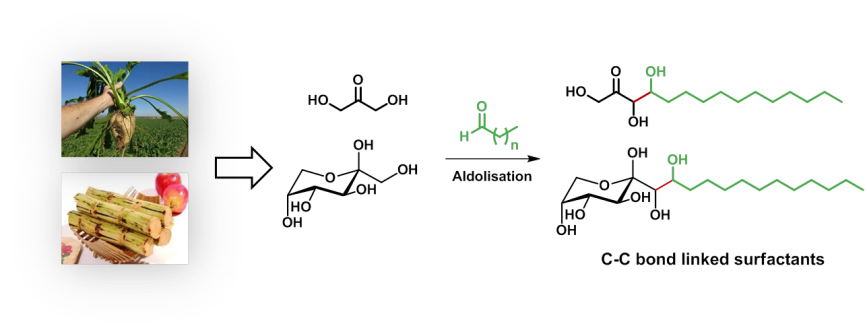We are interested in the valorization of natural polyols and sugars that are abundant and relatively cheap in order to prepare bio-based compounds such as solvents, hydrotropes and surfactants. For that purpose, green methodologies are developed for the alkylation of polyols through the creation of C-O and C-C bond.
- The reductive etherification of glycerol using aldehydes, ketones, carboxylic acids or esters as alkylating agents gave a range of glycerol monoethers (GMEs).
[Tetrahedron Lett. 2009, 50, 6891; Green Chem. 2010, 12, 2189; Sci. China: Chem. 2010, 53, 1953; ChemSusChem 2012, 5, 2307; Green Chem. 2013, 15, 786; Chem. Rev. 2015, 115, 8609].
- The methodology was also extended to other bio-based polyols such as erythritol and pentaerythritol.
[Green Chem. 2018, 20, 1250].
- Alkyl sorbitane ethers and alkyl methyl glycopyranoside ethers were also produced through the same methodology. It was shown that dodecyl derivatives exhibit interesting antimicrobial properties against Gram-positive bacteria such as Listeria, Enterococcus and Staphylocuccus Aureus.
[RSC Adv. 2014, 4, 50653; Green Chem. 2016, 18, 1994; Eur. J. Med. Chem. 2017, 128, 98; Bioorg. Med. Chem. Lett. 2017, 27, 4660].
- Recently, we have developed the direct aldolisation of unprotected ketoses, such as dihydroxyacetone and fructose, to produce bio-based surfactants with a robust C-C linkage.
[ACS Sustainable Chem. Eng. 2018, 6, 2630; ACS Sustainable Chem. Eng. 2018, 6, 11695].
